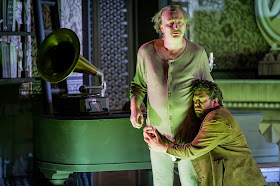 |
| Don Quichotte - Act one - photo credit Robert Workman |
Reviewed by Robert Hugill on Jun 22 2014
Star rating:
Stylish and imaginative production of Massenet's rarely performed opera.
Massenet's Don Quichotte is the best known of his group of late operas written for Montecarlo. Premiered in 1910, it has retained a toe-hold in the repertoire thanks to its rewarding role for a bass (the work was premiered with Chaliapin in the title role). The opera was very much this season's novelty at Grange Park Opera; we caught the 22 June performance. Directed and designed by Charles Edwards, with costumes by Gabrielle Dalton, it featured Clive Bayley as Don Quichotte, David Stout as Sancho Panza, Sara Fulgoni as Dulcinee plus Prudence Sanders, Sylvie Bedouelle, Alberto Sousa and Jorge Navarro-Colorado as Dulcinee's admirers. The BBC Concert Orchestra was conducted by Renato Balsadonna.
Grange Park Opera's performances of Don Quichotte were the first staged in the UK in living memory to be sung in French. ENO's production 20 years ago starring Richard Van Allan was sung in English. More recently Chelsea Opera Group performed it in concert with Robert Lloyd and Donald Maxwell, also conducted by Renato Balsadonna.
When Massenet wrote Don Quichotte he was ageing and ill, and also looking out for a vehicle for his most recent amour, the mezzo-soprano Lucy Arbell. Charles Edwards, rather imaginatively, decided to combine these facts so that Don Quichotte's obsession with Dulcinee merged with Massenet's with Lucy Arbell.
 |
| Clive Balyley and David Stout- photo credit Robert Workman |
It worked, though you had to keep an open mind about some of the details. And chatting afterwards at least one friend in the audience had no idea what was going on. But Massenet's opera has very little to do with Cervantes and the piece can very much be seen as a product of the composer's final amour. What made the piece was that Edwards had got finely nuanced performances from Clive Bayley and David Stout.
Stout's Sancho Panza was superbly rounded (both physically and in terms of character), brilliantly coruscating in his diatribe about women. And his speech in act four rounding on the crowd and supporting his master, was superbly done with a strong dramatic edge but with great emotion too.
Bayley was touching and funny as the confused composer/Don Quichotte, bumbling yet full of pathos. And always with a sense of upright nobility. His death scene was finely done, no comedy there. The elderly composer heard Dulcinee for one last time and expired; Bayley perfectly captured the mood without laying it on too thick. Both Bayley and Stout had a lovely feel for the fluidity of Massenet's line which needs a combination of elegance and passion.
The remaining characters are barely sketched in. Dulcinee makes two appearances and in neither do we get much depth of character. Sara Fulgoni simpered and smouldered delightfully though her fruity mezzo-soprano voice seemed rather too darkly robust for the role. There were moments when I found her vibrato a little disturbing but Fulgoni is a consummate artist and she was stylish and charming.
Sanders, Bedouelle, Sousa and Navarro-Colorado as the four admirers, bravely coped with traditional Spanish costumes in act one, but were in 1910 period formal wear in act four. Sousa and Navarro-Colorado made a stylish pair of suitors, creating a deal of character from very little and providing some fine singing. Sanders and Bedouelle in the trousers roles were equally impressive.
Renato Balsadonna conducted with brio and style. From the first moments of the overture the BBC Concert Orchestra impressed with the elan and brilliance of their performance. Balsadonna had a good ear for Massenet's orchestral colours and ensured that details counted whilst never lingering over much.
Charles Edwards production was imaginative, and entertained with some style. It managed to be amusing, whilst ensuring the more serious, darker side was present too. I am not quite sure that Edwards concept worked perfectly, but in Bayley and Stout he had the perfect Don Quichotte and Sancho Panza.
[Update: Apologies to both David's for getting the wrong David S for the role of Sancho Panza, now corrected]
Elsewhere on this blog:
- Father and Daughter: Songs and trios by Andrzej & Roxanna Panufnik - CD review
- Sacred music: An encounter with Jorge Grundman - interview
- Rich and Stylish: Early Opera Company in Charpentier - concert review
- Young Artists at Opera Holland Park: Il barbiere di Siviglia - Opera review
- Back to the Future: Tallis Scholars in Taverner - CD review
- The voice and the lens: Spitalfields Summer Music Festival - concert review
- Duet perfection: Handel Duetti da Camera - CD review
- A voice not enough: A further encounter with Nelly Miricioiu - interview
- Four Quarters: Aurora in Ades - concert review
- Sparkling: Le Jardin de Monsieur Rameau, Les Arts Florissants - CD review
- A night at the museum: Spitalfields Summer Music Festival - concert review
- Home

No comments:
Post a Comment